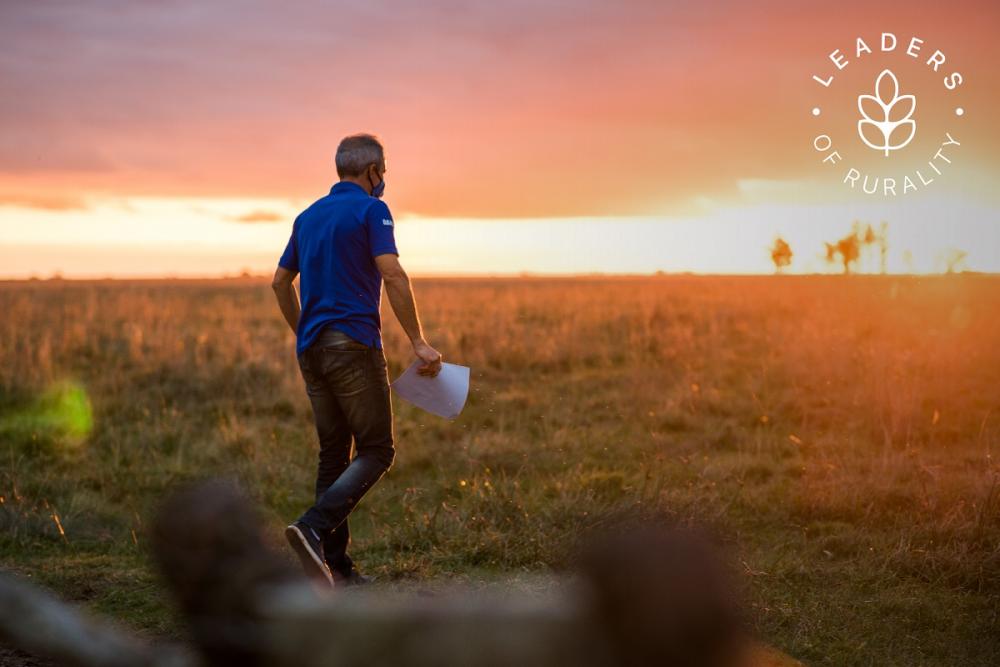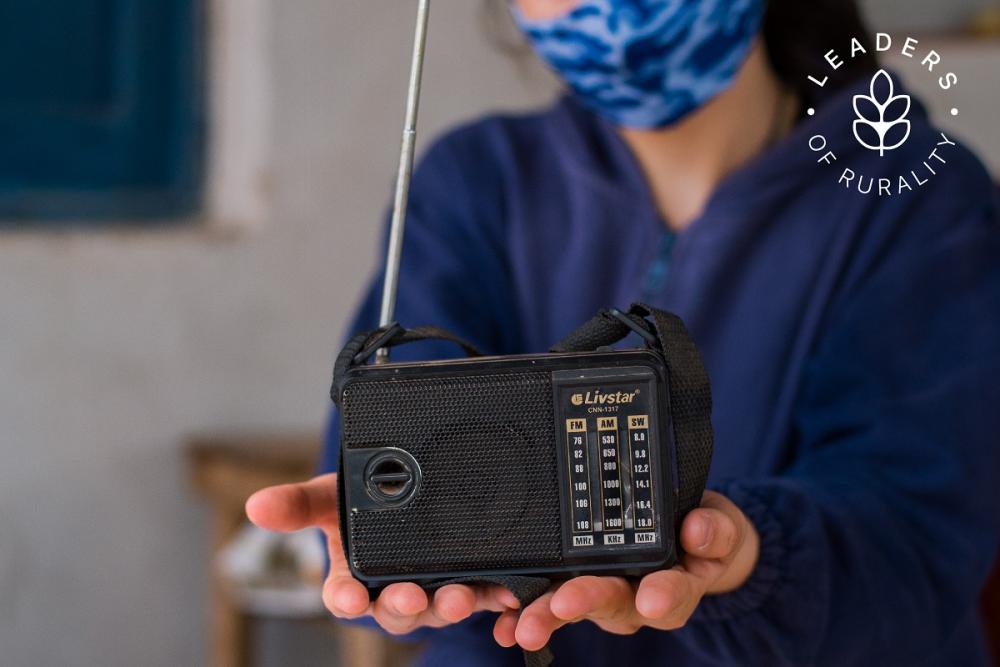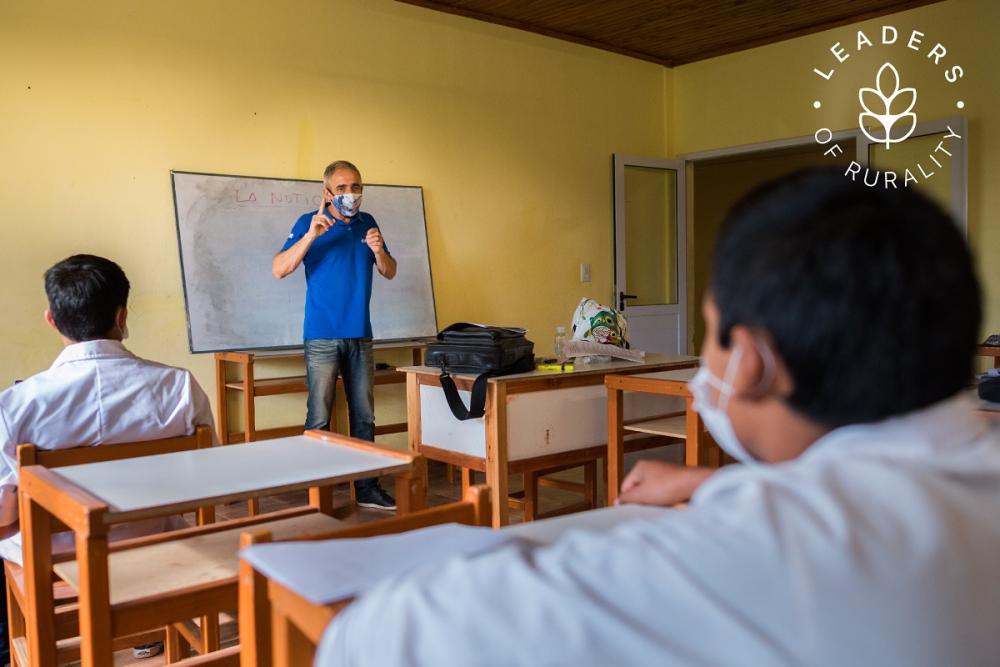Bruno lives in San Roque, a small city in the province of Corrientes in northeastern Argentina, where he advocates that formal education should train young people in food production methods, along with improving education in rural areas to generate opportunities for individual and collective development to help halt migration to the cities.

San Jose, 24 June 2021 (IICA). Daniel Bruno, who during the pandemic kept his rural students connected to the classroom over FM radio, will receive the “Soul of Rurality” award, bestowed on noteworthy Leaders of Rurality in the Americas by the Inter-American Institute for Cooperation on Agriculture (IICA).
The award is part of an initiative by the specialized agency in rural and agricultural development to recognize the men and women who are leaving their mark and making a difference in the rural areas of Latin America and the Caribbean.
Bruno lives in San Roque, a small city in the province of Corrientes in northeastern Argentina, where he advocates that formal education should train young people in food production methods, along with improving education in rural areas to generate opportunities for individual and collective development to help halt migration to the cities.
In addition to receiving the “Soul of Rurality” award, the Leaders of Rurality recognized by IICA will be invited to participate in several of the agency’s advisory bodies.
“This award pays tribute to those who are playing a unique dual role: guaranteeing food and nutritional security by producing under all circumstances, and protecting the biodiversity of the planet. It will also emphasize their capacity to be positive role models in the rural areas of the region”, stated Manuel Otero, Director General of IICA.
Within the framework of this initiative, IICA strives to ensure the recognition opens spaces for cooperation with state, civil society, and private sector organizations to gain support for their causes.
“These are people whose influence can be seen in the food that we eat—wherever it may end up—and in each plot of agricultural land and in the communities where farmers and their families live. These are men and women who are leaving their mark and are the soul of rurality because they produce, plant, harvest, create, innovate, and unite”, reflected IICA’s Director General upon launching the initiative.
“They embody silent leadership, which is something we should spotlight and recognize. Above all, they are role models, because they transform, overcome adversity, and inspire”, he added.
IICA is working alongside its 34 Delegations in the Americas to select the first #LeadersofRurality.
The results of the initiative’s first phase will be presented to IICA’s Executive Committee, one of the Institute’s governing bodies.
“Where there’s a teacher, there’s hope”, says Daniel Bruno, the teacher who kept his students engaged during the pandemic over the radio

Buenos Aires. Daniel Bruno has lived his entire life in San Roque, a city of about 10,000 in the province of Corrientes in northeastern Argentina.
Close to the Parana River, the area is characterized by nature and rurality, with fertile soils and abundant rains, and where agriculture is the livelihood of the majority of the population.
Rice, fruit, and vegetables are grown for both self-consumption and trade as a means to provide for the farming families who work on small plots of 20 to 40 hectares.
Cattle farming and forestry are also important activities in the area.
Bruno, however, is not a farmer, but has always contributed to his community as a rural school teacher and journalist. For the past few years, he has taught artistic language and communication, a class in which he encourages his high schoolers at Madre Teresa de Calcuta to let go of their fear of the microphone and go on radio.
Madre Teresa de Calcuta is a school located 33 kilometers from the city of San Roque, in the town of Colonia Pando, attended by the children of the area’s farming families. It’s very common for these children to return home from school and to help their families with the many jobs on the farm.
Just like the rest of the world, the tranquil farm life of the province of Corrientes changed in early 2020 as a result of the Covid-19 pandemic.
When regular classes were canceled, Bruno first thought to stay in touch with his students through WhatsApp, but he would soon find that the method presented major challenges.
“I took a poll and of 44 children, only 27 had WhatsApp, and even they found it difficult to connect because there isn’t Wi-Fi out in the fields and cell service is insufficient or precarious. One of my students would even climb a windmill to get a better signal whenever he would send me his homework. So, I had to negotiate the connectivity gap with what little equipment we had”, tells Bruno.
In this context, to continue teaching, Bruno turned to the radio, specifically the FM station in San Roque—the most-listened-to station in the area.

“Not every rural home has a cell phone, but in almost every one there is a radio, which still holds an important place in the lives and culture of farmers. So, by broadcasting my lessons over the radio, I increased the possibility of reaching my students”, he said.
Bruno is convinced that education is key to creating a sense of belonging in rural areas, as well as opportunities for individual and collective development to help halt migration to the cities.
He also maintains that formal education must train young people in food production methods and how to develop the production potential of the rural environment to promote the prosperity of the communities.
“Technical schools are necessary. We need more and more because they offer an opportunity for young people to dive deeper into agriculture and to take that knowledge back home to develop new practices and improve all of our lives”.
Bruno explains that “the parents think it is important for their children to go to school and not drop out. There are a lot of the older generation who didn’t finish their schooling and today have a desire to return. That’s why, using the radio, I dream of creating a project that would allow people who dropped out to finish their schooling. It’s difficult for a lot of people to finish their studies, whether due to work responsibilities or because they live in rural areas that are even further away”.
Everyone in the area knows Daniel Bruno. He has managed the FM radio station for the past 22 years and even tried his hand at local politics. Today, he supplements his classes, broadcasted twice a week, with written material crammed into notebooks. From time to time, he drives dozens of kilometers in his pickup to distribute the printouts to his students.
“Education favors a connection to and identification with the rural environment”, says Bruno. “I hope I can continue generating opportunities not only for our children, but for those who stopped along the way and weren’t able to finish, whether due to work or the lack of adequate conditions”.
“Equal opportunities must be available to everyone: to the children who live in the cities, towns, and the countryside. That’s why we’re going to continue doing what we can, no matter how small. I’m convinced that where there’s a school or where there’s a teacher, there’s hope”, he concluded.
More information:
Institutional Communication Division.
comunicacion.institucional@iica.int











